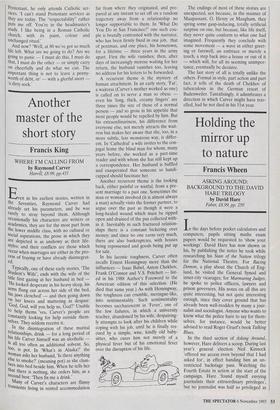Another master of the short story
Francis King
WHERE I'M CALLING FROM by Raymond Carver Harvill, £8.99, pp.431 Even in his earliest stories, written in the Seventies, Raymond Carver had already set his parameters, and he was rarely to stray beyond them. Although occasionally his characters are writers or academics, they are for the most part from the lower middle class, with no cultural or social aspirations, the prose in which they are depicted is as unshowy as their life- styles; and their conflicts are those which °ccur when marriages are either in the pro- cess of fraying or have already disintegrat- ed.
Typically, one of these early stories, 'The Student's Wife', ends with the wife of the title first gazing at her husband in bed — He looked desperate in his heavy sleep, his arm. s flung out across her side of the bed, his jaws clenched' — and then going down ?II her knees and muttering in despair: God, God, will you help us, God?' Unable to help thems 'ves, Carver's people are constantly looking for help outside them- selves. They seldom receive it. In the disintegration of these marital relationships, drink — for a long period of h. 15 life Carver himself was an alcoholic — ls all too often an additional solvent. So, too, is pot. In 'What's in Alaska?' the Woman asks her husband, 'Is there anything else to smoke?' (meaning pot) as she clam- bers into bed beside him. When he tells her that there is nothing, she orders him, as a second best: 'Then fix me a drink.' Many of Carver's characters are flimsy transients living in rented accommodation far from where they originated, and pre- pared at any instant to set off on a random trajectory away from a relationship no longer supportable to them. In 'What Do You Do in San Francisco?' one such cou- ple is brutally contrasted with the narrator, who has been firmly fixed in one job, that of postman, and one place, his hometown, for a lifetime — three years in the army apart. First the wife vanishes; then, after days of increasingly morose waiting for her return, the husband vanishes too, leaving no address for his letters to be forwarded.
A recurrent theme is the mystery of human attachment. In an early story, 'Fat', a waitress (Carver's mother worked as one) is called on to serve a man so obese — even his 'long, thick, creamy fingers' are three times the size of those of a normal person — and so gross in his appetite that most people would be repelled by him. But his extraordinariness, his difference from everyone else, not merely attracts the wait- ress but makes her aware that she, too, in a more subtle, less monstrous way, is differ- ent. In 'Cathedral' a wife invites to the con- jugal home the blind man for whom, many years before, she worked as a part-time reader and with whom she has still kept up a correspondence. Her husband is baffled and exasperated that someone so handi- capped should fascinate her. Another recurrent theme is the looking back, either painful or wistful, from a pre- sent marriage to a past one. Sometimes the man or woman involved (it is almost always a man) actually visits the former partner, to argue over the past as though it were a long-healed wound which must be ripped open and drained of the pus collected with- in it. Inevitably in such fractured relation- ships there is a constant bickering over money; and since no one earns very much, there are also bankruptcies, with houses being repossessed and goods being put up for sale.
In his laconic toughness, Carver often recalls Ernest Hemingway more than the influences — Isaac Babel, Anton Chekhov, Frank O'Connor and V.S. Pritchett — list- ed in his 1988 Author's Foreword to the American edition of this selection. (He died that same year.) As with Hemingway, the toughness can crumble, meringue-like, into sentimentality. Such sentimentality becomes saccharescent in 'Fever', one of the few failures, in which a university teacher, abandoned by his wife, despairing- ly attempts to look after his children while coping with his job, until he is finally res- cued by a simple, wise, kindly old baby- sitter, who cures him not merely of a physical fever but of his emotional fever over the disruption of his life.
The endings of most of these stories are unexpected, not because, in the manner of Maupassant, 0. Henry or Maugham, they spring some gasp-inducing, totally artificial surprise on one, but because, like life itself, they never quite conform to what one had imagined. Frequently they conclude with some movement — a wave in either greet- ing or farewell, an embrace or merely a touch, a step back into a house or out of it — which will, for all its seeming unimpor- tance, eventually be decisive.
The last story of all is totally unlike the others. Formal in style, part action and part fact, it tells of the death of Chekhov of tuberculosis in the German resort of Badenweiler. Tantalisingly, it adumbrates a direction in which Carver might have trav- elled, had he not died in his 51st year.










































































 Previous page
Previous page